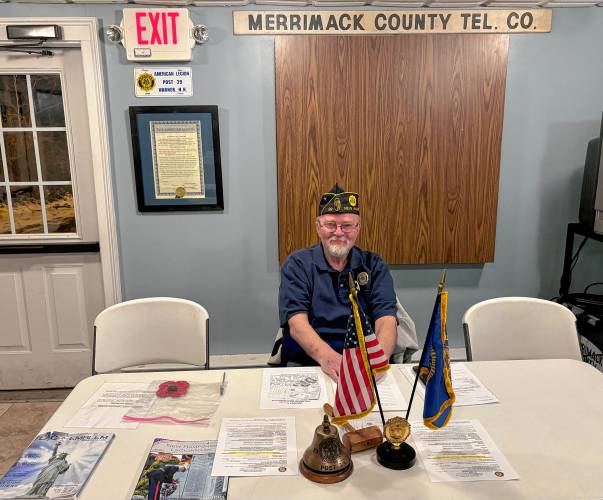With heavy property tax burden, help for veterans considered at both state and local level

Charlie Towbridge, commander of the American Legion Post 39, collected signatures in Warner for a citizen's petition to expand the veterans tax credit at the New Hampshire Telephone Museum in January. Michaela Towfighi—Monitor staff
| Published: 02-05-2025 2:10 PM |
Charlie Trowbridge has one question for veterans like himself.
If their spouse were to pass tomorrow, would they be financially set? With older adults likely dependent on Social Security checks, and property taxes often outpacing that income, Trowbridge fears the answer is no.
In that case, every little bit helps, he said, including annual tax credits available for veterans. That’s especially true in a state where the property tax burden is among the highest nationwide.
As Commander of the American Legion Post 39 – which covers Warner, Sutton and Bradford – Trowbridge is petitioning for town voters in Warner to increase two tax credits which would offer an increased reduction from $500 to $750.
“It’s tough,” said Trowbridge, who lives in Sutton. “I lost my wife a year and a half ago and now I’m down to one check. I don’t even know what my taxes are going to be like.”
He’s not alone in this thinking either. In the State House, Rep. Mike Moffett, a Loudon Republican and fellow veteran, has also sponsored legislation to increase the disabled veterans tax credit for those eligible.
Moira Ryan choked up, speaking in support of Moffett’s proposal in the state house last month. As a veteran herself, she knows many are timid to ask for help but in need.
“I support this 100 percent,” she said. “I do believe there are many veterans who are struggling.”
Article continues after...
Yesterday's Most Read Articles
 State Supreme Court says towns can keep excess school taxes rather than sharing them with poorer towns
State Supreme Court says towns can keep excess school taxes rather than sharing them with poorer towns
 City prepares to clear, clean longstanding encampments in Healy Park
City prepares to clear, clean longstanding encampments in Healy Park
 Both remaining Rite Aid stores in Concord slated for closure
Both remaining Rite Aid stores in Concord slated for closure
 New fair coming next week to Everett Arena in Concord
New fair coming next week to Everett Arena in Concord
 Universal EFA program sees 500 applications in day one of expansion
Universal EFA program sees 500 applications in day one of expansion
 Big projects, both noticed and ignored, marked Chip Chesley’s long career in Concord
Big projects, both noticed and ignored, marked Chip Chesley’s long career in Concord
Currently, the state offers several tax credits for veterans – the standard tax credit, all veterans tax credit, optional credit for combat service, surviving spouse credit and a service-connected disability credit.
Certain disabled veterans can also apply for a total exemption on their property. That comes with more stipulations, such as a requirement that they must have purchased the homestead with the help of the Veterans Association.
For all tax credits, municipalities vote to set the award within set guidelines provided by the state. In Concord, the all-veterans tax credit is $200 while in Boscawen it is $500.
The standard veterans tax credit is limited to people who served in World War I, World War II, the Korean Conflict, Vietnam Conflict and Persian Gulf War, as set by state statue.
The all veterans tax credit applies to residents who have lived in New Hampshire for at least one year, served more than 90 days in the armed forces, have been honorably discharged or terminated due to disability and apply for it through the town.
If Warner voters choose to adopt the expanded credits at their March Town Meeting, he hopes to use the win as a model for other communities.
“If it works out and they adopt this, I can go to Sutton and go to Bradford and say, ‘Hey, look, guys, this is what's going on’,” he said.
In 2023, Bow held a special town meeting in August after readopting a $500 veterans tax credit that was accidentally left off the town ballot in March. There, residents approved an additional increase, bringing the total to $750.
Moffett’s original proposal with House Bill 99 looked to increase the credit offered for veterans who are permanently disabled to cover 100 percent of their property tax bill. Towns would still have to adopt the full coverage, if they chose to do so, he said.
“For example, say that good folks in Any Town, New Hampshire know that their neighbor, Mr. Jones, who is totally disabled due to injury suffered in Afghanistan, simply can’t afford to pay his property taxes and will have to give up his home and leave,” he said. “Local officials in Any Town would have the option of giving Mr. Jones a break so he can stay.”
The House Municipal and County Government committee amended Moffett’s proposal to have a $5,000 ceiling, rather than covering all property taxes for those eligible. It will go to the full House for a vote on Feb. 6.
In Warner, Trowbridge collected enough signatures that voters will decide on the tax credit increases at Town Meeting on March 13.







 Find a tick on yourself? This NH nonprofit wants to see it.
Find a tick on yourself? This NH nonprofit wants to see it. ‘It was painful’: Senate passes state budget
‘It was painful’: Senate passes state budget Finalizing the budget: What to look for in the State House this week
Finalizing the budget: What to look for in the State House this week Bow offers water to Hooksett plant, asks Concord to help fix its supply
Bow offers water to Hooksett plant, asks Concord to help fix its supply
